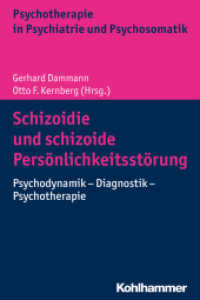Full Description
Education is a main issue in all countries. Policy makers, educators, families, students and, in a more general way, societies expect schools to provide a high quality education. They also expect students to be able to achieve and to become active and critical citizens. As senior researchers in education, we address some of the most complex and demanding research questions: How does learning affect identity? How does participation to educational settings, scenarios and situations impact the way we are or became? Can changes in how we perceive our Selves be considered as part of the learning process?
This book attempts to outline some answers to such broad questions using a very robust and updated theoretical frame: the dialogical approach. In these chapters very well-known international authors from different continents and countries analyze school and educational situations through new lens: by considering the teaching and learning processes as multi-voiced and socially complex and considering identity development as a true leverage for development.
The focus on the dialogical nature of both learning and identities makes this book interesting not only for educators and educational researchers but also for anyone interested in human sciences, policy makers, students and their families. We also aimed at producing a book that can be useful for different cultures and educational systems. Thus, in this book there are researches and comments from different cultural perspectives, making it appealing for a very large target-public.
Contents
Preface: From Ruptures to Rich Points: How Education Enables Development, Jaan Valsiner.
Introduction: Dialogical Learning and Dialogical Self: Two Stories and Many Interplays, M. Beatrice Ligorio.
Section I. Dialogical Approach to Learning.
Chapter 1. Dialogical Knowing and Believing: Trust and Responsibility in the Context of Learning, Ivana Marková.
Chapter 2. Learning to Think as Becoming Dialogue: An Ontologic-Dialogic Account of Learning and Teaching Thinking, Rupert Wegerif.
Chapter 3. Argumentation in the Piagetian Clinical Interview: A Step Further in Dialogism, Lysandra Sinclaire-Harding, Céline Miserez, Francesco Arcidiacono, and Anne-Nelly Perret-Clermont.
Chapter 4. Commentary: Dialogue About Dialogue: Three Similar/Different Voices, Elena Yudina.
Section II. Crossing Contexts: Identities at the Borders.
Chapter 5. Cultural Elements as Means of Constructing the Continuity of the Self Across Various Spheres of Experience, Tania Zittoun and Michèle Grossen.
Chapter 6. Nowadays I Think, 'Wow: I Made It': Exploring Immigrant Transitions Drawing on Dialogical Self Theory and the Notion of Symbolic Resources, Guida de Abreu, Ria O'Sullivan-Lago, and Hannah C. Hale.
Chapter 7. Collaborative Work, Dialogical Self and Inter-/Intra-Empowerment Mechanisms: (Re)constructing Life Trajectories of Participation, Margarida César.
Chapter 8. The Dialogic Construction of Agency in Classroom Communities, Kristiina Kumpulainen and Lasse Lipponen.
Chapter 9. Educational Self: A Fruitful Idea? Antonio Iannaccone, Giuseppina Marsico and Luca Tateo.
Chapter 10. Parent-Teacher Conversations in Multiethnic Schools: The Dialogic Nature of Explaining Students' Academic Achievement, Mariette de Haan, Ed Elbers, and Inge Wissink.
Chapter 11. Commentary: Collisions, Confrontations, and Collaborations of the Self in Culture, Nandita Chaudhary.
Section III. Contexts and Interactive Interplays to Develop the Self.
Chapter 12. Exploring Dialogic Opportunities for Learning and (Re)negotiating Selves: An Ethnographic Telling Case of Learning to Be Social Scientists, Laura Hill-Bonnet, Judith Green, Beth Yeager, and Jacqueline Reid.
Chapter 13. Blended Learning as a Context for Dialogical Access to Zones of Proximal Development, M. Beatrice Ligorio, F. Feldia Loperfido, and Paola F. Spadaro.
Chapter 14. Being Aspie or Having Asperger Syndrome: Learning and the Dialogical Self at WrongPlanet.net, Kim Davies and Peter Renshaw.
Chapter 15. Dialogic Learning in Teachers' Professional Identities, Kara Vloet, Gaby Jacobs, and Wiel Veugelers.
Chapter 16. Commentary: Dialogism and Otherness in Self-Development, Maria Cecília Camargo Magalhães.







